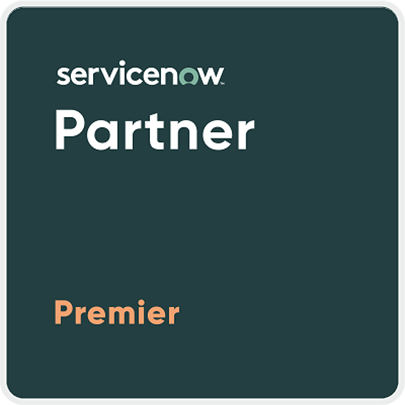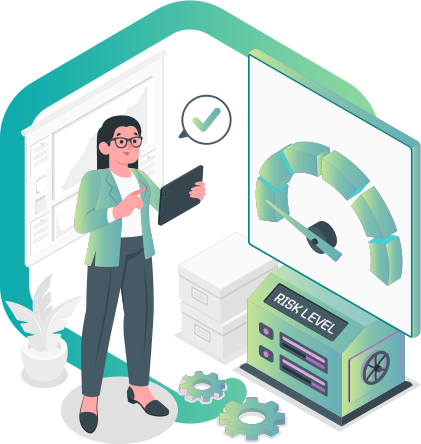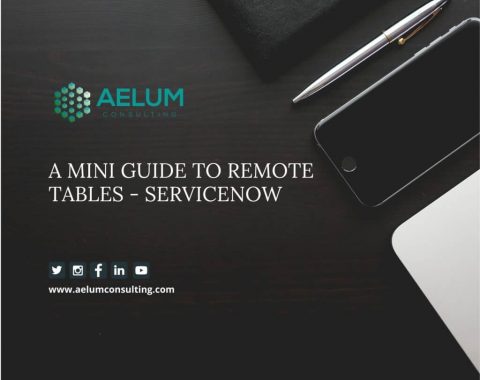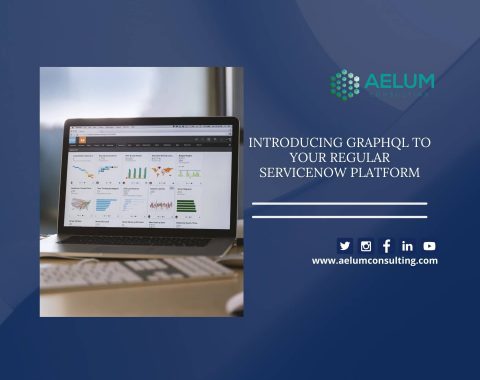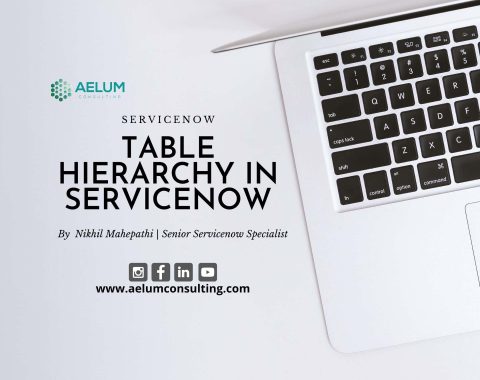Continuously monitors risk exposure, improves risk-based decision-making, and reduces reaction time with ServiceNow Operational Risk Management.
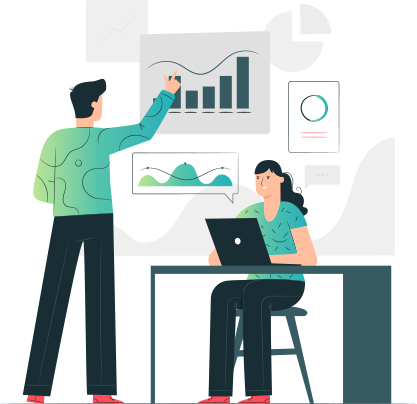
Operational Risk Management
ServiceNow Operational Risk Management is a module under the ServiceNow Integrated Risk Management suite that helps organizations identify, assess, and mitigate operational risks across the enterprise.
It provides a centralized platform for managing operational risks.
Also, it enables organizations to identify and prioritize risks, implement controls to mitigate risks, and continuously monitor and report on risk management activities.
ServiceNow Operational Risk Management Process
-
Risk Identification
Identify potential risks that may affect the organization. You can determine through various means, such as incident reports, audit findings, and risk assessments.
-
Risk Assessment
Get a structured approach to risk assessment with ServiceNow Operational Risk Management Process to assess the likelihood and potential impact of identified risks.
-
Risk Mitigation
Get a framework for developing and implementing risk mitigation plans, assigning responsibility for control implementation, and monitoring the effectiveness of controls.
-
Risk Monitoring
Monitor risks and ensure their management is appropriate. ServiceNow ORM provides real-time risk monitoring capabilities to identify and respond to emerging risks.
-
Compliance Management
Ensure compliance with relevant laws, regulations, & standards. Get a framework for compliance management to track needs and assess risks with ServiceNow ORM.
-
Reporting and Analytics
ServiceNow operational risk management provides dashboards and reports to monitor risk management activities, track key risk metrics, and identify improvement areas.

Benefits of ServiceNow Operational Risk Management
Improved Risk Visibility
Provide a comprehensive view of operational risks across the organization. It helps to identify and prioritize risks and enables stakeholders to make informed decisions to mitigate them.
Better Collaboration
Improve alliance between risk management teams and other stakeholders, like business units and IT. It provides a common platform to share data, track risks, and coordinate actions.
Compliance Management
Provide a framework for compliance management complying with regulations & standards such as ISO 31000, COSO, & NIST. Assess and manage compliance risks, automate tasks, and track activities.
Streamlined Processes
Processes, making them more efficient and effective. It helps to automate risk assessments, control testing, issue tracking, and reporting, reducing the burden of manual processes.
Integrated Risk Management
Integrate modules, such as GRC, ITSM, and SecOps, enabling organizations to take a holistic approach to risk management. Get real-time insights and analytics to improve their risk posture.
Enhanced Decision Making
Provide real-time risk data, enabling stakeholders to make informed decisions based on the latest data. It also provides analytics and reporting to identify trends and prioritize efforts.
ServiceNow Operational Risk Management Features
Risk Control Self-Assessment
Assess the control environment & identify gaps & opportunities. Users can create custom assessments to evaluate the efficacy of controls, track testing results, and prioritize risk management efforts.
Control Assurance/Testing
Test the effectiveness of organizational controls to ensure they are operating as intended. Users can create control testing plans, track results, and manage control deficiencies.
Continuous Monitoring
Monitor risks and controls in real-time to quickly identify and respond to emerging risks. It can help maintain visibility into their risk landscape and provide stakeholders with up-to-date risk information.
Incident and Loss Capture
Capture and track incidents and losses, helping organizations to identify potential trends and root causes. Users can create incident reports, track loss events, and manage remediation efforts.
Advanced Risk Assessment
Perform advanced risk assessments, including scenario analysis, stress testing, & probabilistic risk assessments. It can help better understand risk exposure and prioritize risk management efforts.
Risk and Controls Taxonomy
Develop a standardized risk and controls taxonomy to classify risks and controls across the organization. It can help streamline risk management processes and ensure consistency in risk reporting.
Integrated Issue Management
Manage risk-related issues, including tracking and managing remediation efforts. Users can create issue reports, assign ownership, and track remediation efforts, facilitating cross-functional collaboration.
AI-Assisted Risk Management
Identify & prioritize risks, improve risk assessments, and automate risk management processes. Offers collaboration and communication, ensuring all stakeholders’ alignment on priorities and activities.
Multi-Level Approval Workflows
Create multi-level approval workflows, ensuring the appropriate stakeholders approve the risk management activities. This feature can help organizations improve risk management governance and oversight.
Assessment Simulation
Simulate risk scenarios to identify potential vulnerabilities and test the effectiveness of controls. It can help improve risk management capabilities and ensure preparation to respond to emerging risks.
Examples of ServiceNow Operational Risk Management
Financial Services
Automate its risk assessment process to identify and prioritize risks quickly. The company can reduce the time required for risk assessments by 75% and improve the quality and accuracy of risk assessments.
Manufacturing
Develop a risk management program aligned with business objectives and risk appetite. They can identify and prioritize risks more effectively, implement controls to mitigate risks and improve overall risk posture.
Technology
Develop a risk management program integrated with their existing IT systems. They can identify and prioritize IT risks more effectively, implement controls to mitigate risks and improve overall IT risk posture.
Energy
Develop a risk management program, including assessments, control testing, and incident management. They can identify and prioritize risks, implement controls to mitigate risks, & improve overall posture.
Education
Develop a risk management program addressing data privacy, cybersecurity, and compliance. They can improve risk visibility, mitigate risks more effectively, and reduce the time required for risk assessments.
Healthcare
Develop a risk management program, including assessments, control testing, and incident management. They can reduce incident numbers by 50% and improve compliance with HIPAA regulations.
Government
Improve compliance with state and federal regulations. They can automate compliance management processes, reducing the time required for compliance activities and improving compliance with rules.
Retail
Develop a risk management program addressing supply chain disruptions, cybersecurity, and compliance. They can improve risk visibility, mitigate risks more effectively, and reduce the time required for risk assessments.
Insurance
Develop a risk management program aligned with their business objectives and risk appetite. They can improve risk visibility, automate risk management processes, and improve overall risk posture.
Transportation
Develop a risk management program, including risk assessments, controls testing, and incident management. They can improve risk visibility, identify and prioritize risks, and improve overall risk posture.
ServiceNow Operational Risk Management Roles
Risk Manager
Responsible for defining the risk management framework, developing processes, and ensuring regular performance. They also oversee the risk mitigation plans and monitor the progress of risk mitigation efforts.
Business Unit Owner
Responsible for estimating the effort required to complete the work and delivering working software at the end of each iteration. The development team includes developers, testers, designers, and other technical experts who work together to implement the software features.
Control Owner
Responsible for designing and implementing controls to mitigate identified risks. They work closely with the Business Unit Owner and the Risk Manager to ensure effective management and follow them.
IT Manager
Responsible for identifying and assessing risks related to IT systems and infrastructure. They work closely with the Risk Manager to develop risk mitigation plans and ensure IT-related risk management effectively.
Compliance Manager
Responsible for ensuring the organization’s compliance with relevant laws, regulations, & standards. They work closely with the Risk Manager to identify compliance risks and develop appropriate risk mitigation plans.
Auditor
Responsible for conducting periodic audits to ensure risk management processes work effectively. They review risk assessments, controls, and mitigation plans to identify improvement areas & make recommendations.
How Can Aelum Consulting Help with ServiceNow Operational Risk Management?
Aelum Consulting is a well-known Premier ServiceNow Partner in India. We have specialized experts helping organizations with their ServiceNow Operational Risk Management (ORM) programs and other modules. Here are a few ways in which Aelum Consulting can help:
ServiceNow ORM Implementation
We can help implement operational risk management, including configuring the platform, other system integration, and developing risk management processes.
Control Implementation
We can assist in implementing adequate controls to mitigate identified risks. It includes developing policies & procedures, assigning ownership, and monitoring effectiveness.
Risk Reporting and Analytics
We can help generate risk reporting and analytics capabilities, including developing dashboards and reports, tracking key risk metrics, and identifying improvement areas.
Risk Assessment
We can help with risk assessment activities, including identifying potential risks, assessing likelihood and impact, and prioritizing risks for risk management efforts.
Compliance Management
We can help ensure compliance with relevant laws, regulations, and standards, including developing compliance programs, tracking needs, and assessing risks.
ORM Program Optimization
We can help optimize operational risk management programs, including reviewing existing programs and developing strategies for continuous program improvement.
So, we can provide the expertise, guidance, and support needed to develop and implement an effective ServiceNow operational risk management program. Our experienced consultants can work with organizations to tailor their services to specific needs, ensuring the organization’s risk management program alignment with its business objectives and risk appetite.
Components of ServiceNow Operational Risk Management
Governance, Risk, and Compliance (GRC)
ServiceNow operational risk management leverages GRC principles to manage risks, ensure compliance with laws and regulations, and align risk management with organizational objectives.
Quantification, Measurement, and Modeling
ServiceNow operational risk management provides tools for risk quantification and modeling to understand the potential impact of risks and prioritize risk management efforts.
Monitoring and Reporting
ServiceNow operational risk management provides real-time risk monitoring capabilities to monitor emerging risk activities, track key risk metrics, and identify improvement areas.
Behavior Incentivization
ServiceNow operational risk management provides a framework for behavior incentivization to create a culture of risk awareness & encourage employees to take ownership of risk management.
Frequently Asked Questions
ServiceNow Operational Risk Management provides a centralized platform for managing operational risks. It enables organizations to identify and assess risks, implement controls to mitigate risks, and continuously monitor and report on risk management activities. It also provides a framework for integrating risk management activities with other business processes, such as incident management and compliance management.
ServiceNow Operational Risk Management enables organizations to identify and assess operational risks, implement controls to mitigate risks, and continuously monitor and report on risk management activities. It helps organizations improve their risk posture by reducing their exposure to risks and ensuring compliance with regulations and standards related to operational risk management.
You can integrate ServiceNow Operational Risk Management with other modules within the ServiceNow platform, such as Incident Management, Compliance Management, and Vendor Risk Management. It enables organizations to streamline their risk management activities and integrate risk management with other business processes.
ServiceNow Integrated Risk Management is a suite of solutions that help organizations identify, assess, and mitigate risks across the enterprise. It includes modules like Operational Risk Management, Policy and Compliance Management, Vendor Risk Management, and Business Continuity Management.
ServiceNow Vendor Risk Management is a module within the ServiceNow Integrated Risk Management suite that helps organizations assess and manage risks associated with third-party vendors. It provides a centralized platform to keep vendor risk assessments, monitor, and report.
ServiceNow Integrated Risk Management provides a centralized platform for managing risks across the enterprise. It enables organizations to identify and assess risks, implement controls to mitigate risks, and continuously monitor and report on risk management activities.
The benefits of using ServiceNow Integrated Risk Management include improved risk visibility, more efficient and effective risk management processes, and reduced risk exposure. It also helps organizations ensure compliance with regulations and standards and improve their overall risk posture.
ServiceNow Vendor Risk Management provides a centralized platform for managing vendor risks. It enables organizations to assess vendor risks, monitor vendor performance, and report on vendor risk management activities. It also helps organizations ensure compliance with regulations and standards related to vendor risk management.
Our Clients







































